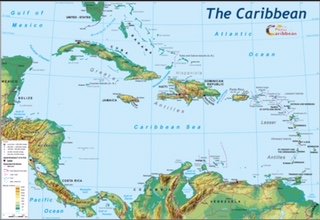The relationship between France and the Caribbean is deeply rooted in history, culture, and modern-day partnerships. From the colonial era to contemporary diplomatic, economic, and cultural exchanges, France continues to play a significant role in the Caribbean region. With both French overseas territories in the Caribbean and strong ties to independent nations, the French-Caribbean connection remains vibrant and dynamic.
French Territories in the Caribbean
Unlike other European nations that fully decolonized, France maintains a direct presence in the Caribbean through its overseas territories, which are considered an integral part of the French Republic. These territories include:
1. Guadeloupe – A group of islands known for their beautiful beaches, rich Creole culture, and economic importance.
2. Martinique – Famous for its blend of French and Caribbean influences, its stunning landscapes, and a strong tourism sector.
3. Saint Martin (the northern half of the island, with the southern half being Dutch Sint Maarten) – A major hub for tourism and commerce.
4. Saint Barthélemy (St. Barts) – A luxury travel destination known for its exclusivity and French-Caribbean charm.
These territories are fully integrated into France and the European Union (EU), meaning they use the euro (€), follow French laws, and receive financial support from France.
Historical Ties: Colonization and the Slave Trade
France’s connection to the Caribbean dates back to the 17th century, when it colonized various islands and established sugar plantations that relied heavily on the transatlantic slave trade. Key historical moments include:
• The establishment of Saint-Domingue (modern-day Haiti) as France’s most profitable colony, producing sugar, coffee, and indigo.
• The Haitian Revolution (1791-1804), led by Toussaint Louverture, which resulted in Haiti becoming the first independent Black republic in the world and the first nation to abolish slavery.
• The abolition of slavery in French Caribbean territories in 1848, following advocacy by figures like Victor Schoelcher.
Despite the painful legacy of slavery, France’s influence shaped the languages, religions, and cultures of its Caribbean territories and former colonies.
Cultural Influence: A Unique French-Caribbean Identity
The French Caribbean culture is a fusion of French, African, and indigenous influences, creating a unique identity seen in language, cuisine, music, and traditions.
• Language: French is the official language, but Creole (Kréyol) is widely spoken and reflects African and Caribbean influences.
• Cuisine: French Caribbean dishes blend French techniques with local ingredients, featuring dishes like accras de morue (cod fritters), colombo (Caribbean curry), and boudin créole (Creole blood sausage).
• Music and Dance: Zouk, biguine, and gwoka music are vibrant genres that combine African rhythms with European melodies.
• Festivals: Carnival celebrations in Martinique and Guadeloupe are legendary, featuring colorful parades, lively music, and traditional costumes.
Economic and Diplomatic Partnerships
France remains an important economic and political partner for independent Caribbean nations through trade agreements, investments, and international cooperation.
1. Trade and Tourism
• French Caribbean territories serve as economic bridges between France and the broader Caribbean.
• Many independent Caribbean nations, like Haiti, Dominica, and Saint Lucia, trade agricultural products, rum, and seafood with France.
• France is a major contributor to Caribbean tourism, with thousands of French visitors traveling to destinations like Saint Lucia, the Dominican Republic, and Jamaica each year.
2. French Support for Caribbean Development
• France provides foreign aid and technical assistance, especially in areas like disaster relief, climate resilience, and infrastructure.
• French agencies work with Caribbean governments on education, healthcare, and environmental sustainability projects.
3. Regional Cooperation
• France is involved in Caribbean regional organizations, such as the Organisation of Eastern Caribbean States (OECS) and the Caribbean Community (CARICOM).
• The French Development Agency (AFD) funds projects in renewable energy, agriculture, and economic growth.
The French-Caribbean Relationship Today
In modern times, France and the Caribbean maintain strong ties through cultural exchanges, diplomatic relations, and economic partnerships. Haiti, despite its complex history with France, continues to receive aid and development assistance. Meanwhile, French Caribbean territories serve as key players in linking Europe and the Caribbean.
As global challenges like climate change, trade, and migration evolve, France remains an active partner in Caribbean affairs, helping shape the region’s future while preserving its shared history and cultural heritage.
Conclusion
The French connection to the Caribbean is one of deep historical roots, cultural richness, and modern collaboration. Whether through language, music, trade, or diplomacy, the ties between France and the Caribbean continue to shape the region in profound ways. Looking ahead, this relationship is set to grow stronger, fostering mutual development and cultural appreciation between France and its Caribbean counterparts.




